The Road
Created by: Manu Larcenet, adapting Cormac McCarthy
Published by: Harry N. Abrams
ISBN: 1419776770 (Amazon)
Pages: 160
Genre: Postapocalyptic, survival, adaptation
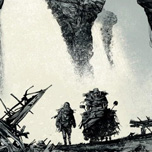



Note: this review speaks about things in both novel and comic that might be considered spoilers by those sensitive to those things.
In McCarthy's first draft of The Road, he has a note linking the story to Kierkegaard on Abraham and Isaac, suggesting that the book is about a man who drives his son toward certain death in staunch hope and faith that death will not win, that the boy will live. That this theme carried through to McCarthy's The Road as we know it is made explicit in the man's insistence that they are carrying the fire, the exact terminology used of Abraham and he and Isaac ascend toward the binding.
McCarthy's book is absolutely carried by a sturdy vein of hope and hopefulness. It's constant in the man's interiority (The boy is his warrant! We've got to go South! and then the reason he takes his particular not-quite-straightforward route to the sea through his old hometown) and present in his conversations with the boy (We carry the fire! Goodness will find the little boy!). They're in a bad place, obviously, but the man is relentlessly optimistic in opposition to his wife who is the realist of the pair—and takes the realist's exit to underscore the fact. They're in a bad place, a bleak place, but in what other setting should hope shine so brightly.
That theme is all over McCarthy's novel, and you can't help seeing it when you read the book, but it's entirely absent in Larcenet's treatment (Larcenet even lops off McCarthy's ending, leaving it more ominously ambiguous than settled in the man's hope attained).
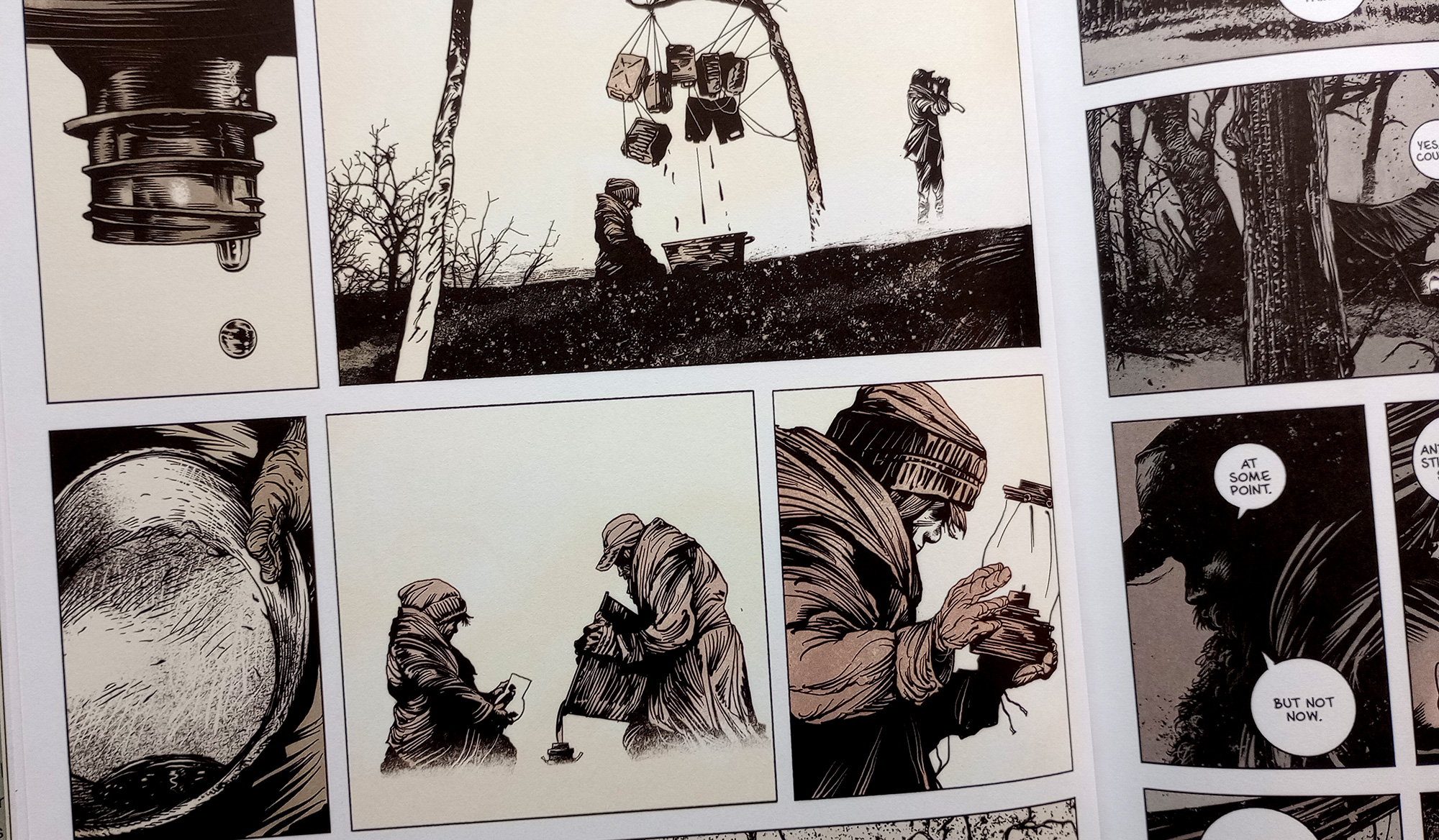 I *love* this panel of them collecting drips of fuel for their lantern. Perfect.
I *love* this panel of them collecting drips of fuel for their lantern. Perfect.
Adaptations are weird and hard. If we approach them without having read the source we might appreciate them so much more. I imagine this would be the case with Manu Larcenet's adaptation of The Road; it's easier to love this comic if you've either got a hazy memory of the novel or, better, no memory of it at all.
Larcenet's The Road is gorgeously illustrated. Strong inks washed over with a much-desaturated palette. His adaptation of the Kentucky-to-South-Carolina route, while feeling not so much like those regions (no Great Smokies!) does feel very much like the end of a world that humanity very well probably won't outlast. Larcenet goes heavy on depicting the bleak despair, the dilapidation, the ramshackle remnant of former things, which as a visual artist rendering the visual aspect of the book, makes a lot of sense. The setting of the novel is unquestionably dire, and Larcent is deeply faithful to the exterior moods we find in McCarthy's text. Unfortunately, I think this is where he goes wrong too. By focusing on what we would naturalistically see, Larcenet misses out on the key to understanding the novel, McCarthy's ode to his own young son and thoughts of the impending apocalyptic.
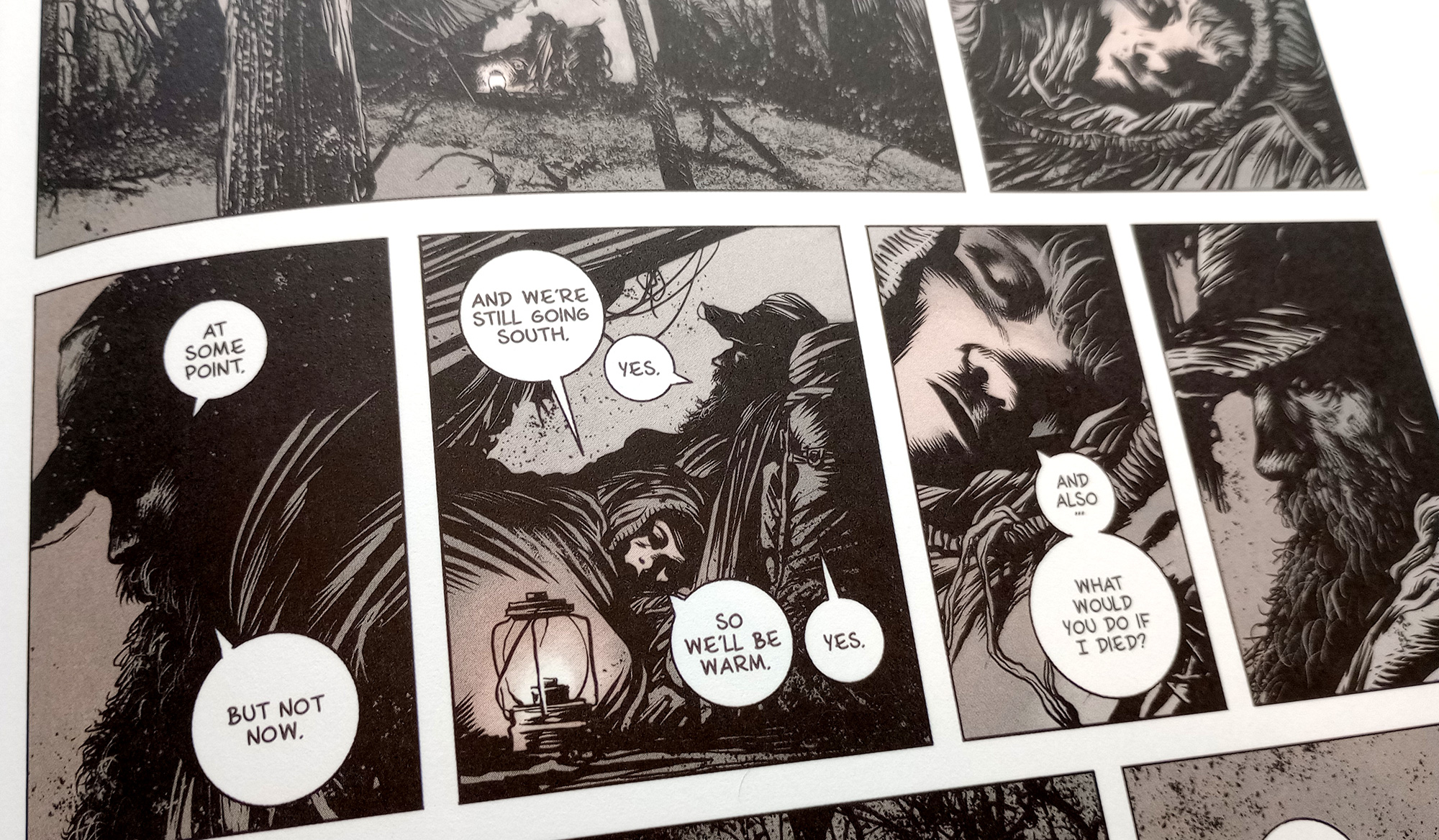
Despite Larcenet's attention to rendering the seen with grim fidelity, he veers as if allergic from rendering the man's interiority—despite comics' ready ability to depict thought through bubble or narrative box—and any conversation that might speak to the motives and wonders that propel them along their dogged path. As gorgeously as it's drawn, because of Larcenet's focus on depicting the visual and his obliteration of the interiority (he also ditches the bulk of McCarthy's own ending for his own more subdued and ambiguous conclusion), it feels a much more truly bleak book, one where hope (when present at all) trickles rather than carries.
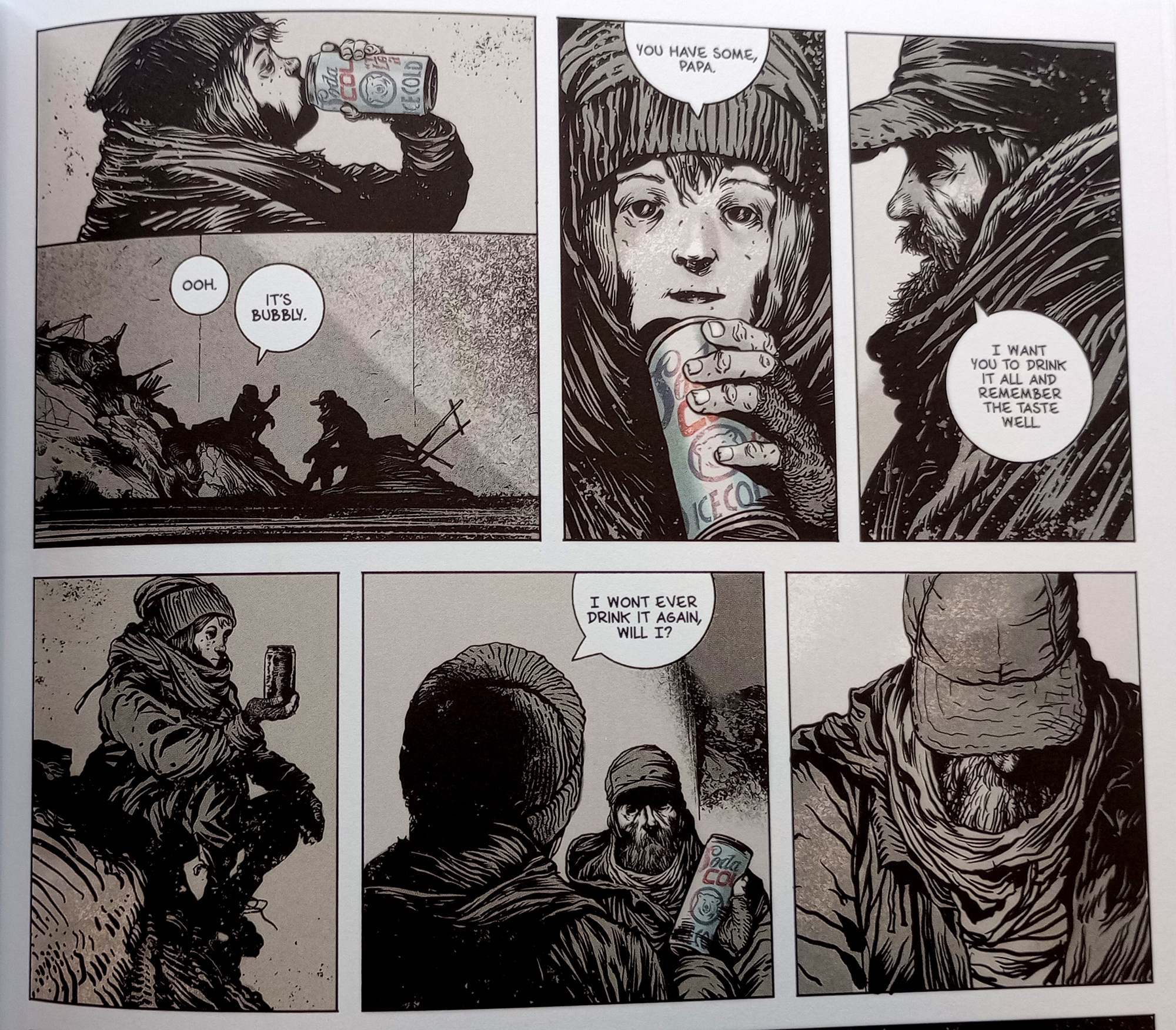
(Beyond, the excision of hope, the book's primary theme, I was a little sad that Larcenet didn't adapt McCarthy's coda with the trout, by which he also eviscerates McCarthy's emphasis on the complex mystery of Being, the mystery of history in a world. It's a strange and thought-provoking conclusion that would have elevated the comic.)
Avoiding these things makes it feel as if Larcenet's The Road is just a grim yarn, whereas their inclusion would have been an attempt toward literature (that thing we hear rumours of occasionally, that thing that genre and YA-only readers seem to believe is just elitist gatekeeping). It's hard to imagine a The Road without lines like, "If he is not the word of God God never spoke," without the woman teaching the boy to pray, without being able to sit and wonder what it means for the man both to give up the idea that he could sacrifice the boy ("I cant. I cant hold my dead son in my arms. I thought I could but I cant.") and then to tell the boy that he the boy carries the fire and always did and how that impacts our understanding of the binding of Isaac allusion. McCarthy's The Road is something you wrestle through with close minds, a solid bookclub, and a fair bit of wine. Larcenet's The Road is something you read on your lunchbreak in Starbucks and then post neat panels from on Twitter.
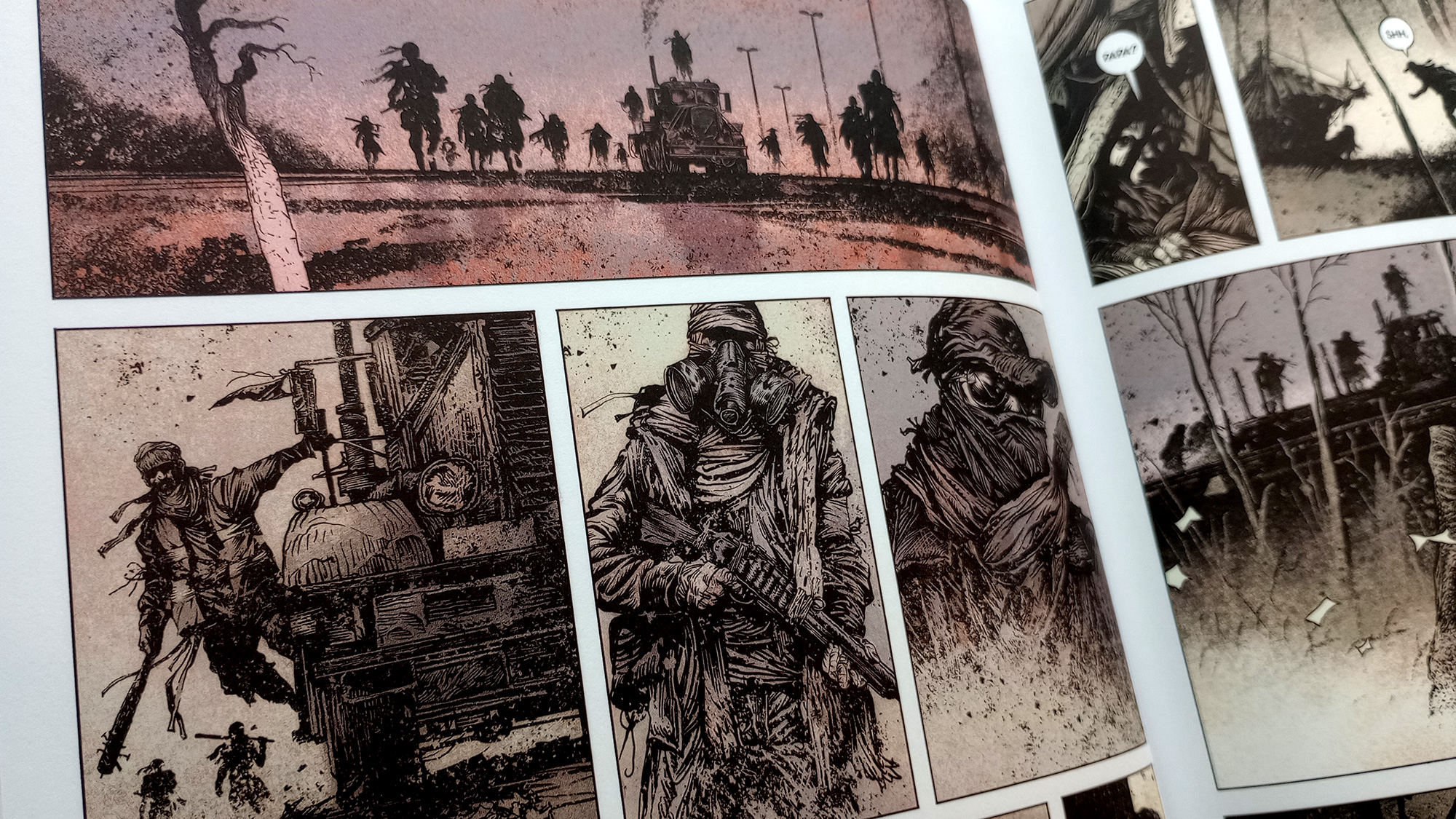
I enjoyed Larcenet's The Road but it only feels like a riff on McCarthy's The Road, like he didn't know what to do with the text so he picked out the parts that best fit with his own vibe and left the rest unadapted. Which is fine. Did he abandon the Godtalk and elevated themes because he didn't understand the book? because they were at odds with his own perspective? because they felt corny to him? is McCarthy the man and Larcenet the man's wife? Who can say but Larcenet himself, but it's certainly a loss, an unforced error.
I like Larcenet's The Road, but I love McCarthy's The Road.
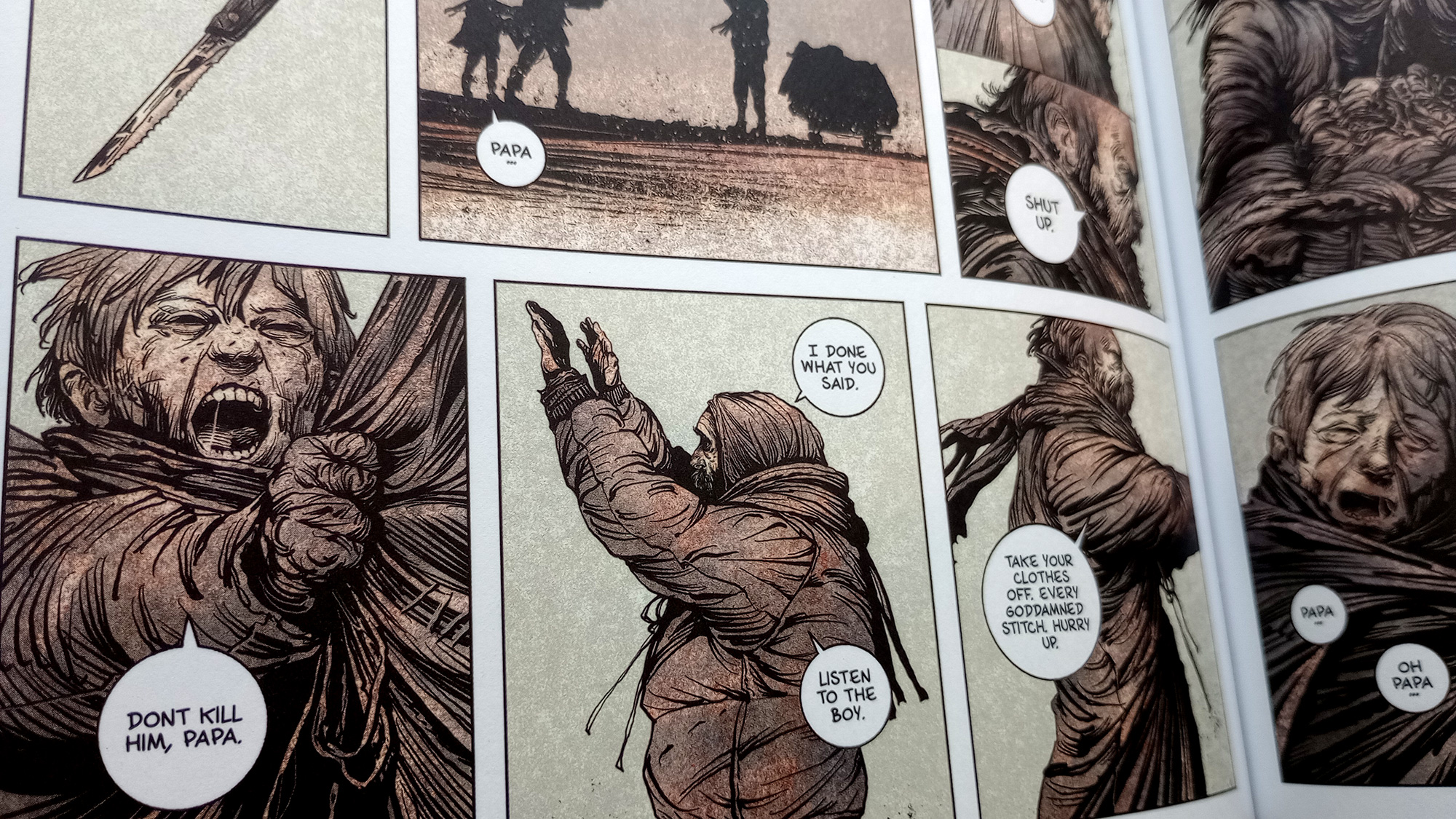
It's always hard to judge adaptations, because if you hold the source in your heart, that will hang over the whole thing. I'm no adaptation purist (my favorite Jane Austen movie is Rozema's 1999 Mansfield Park), but I think that as an adaptation, The Road is not very good. It misses out on near everything that makes the story worthy of adaptation. As a standalone comic though, it's alright. It's gorgeously drawn and atmospheric as hell. At the end though, I wouldn't say it was great (just pretty good maybe?) because there's not enough meat on its bones. After stripping the book of its interiority, of its primary themes, what is left? It's just a downbeat walk down an uncountable stretch of highway. It's a roadtrip movie if there was no patter or character development or human realizations to give the journey meaning. It's beautifully done though, and that shouldn't be minimized!
Good Ok Bad features reviews of comics, graphic novels, manga, et cetera using a rare and auspicious three-star rating system. Point systems are notoriously fiddly, so here it's been pared down to three simple possibilities:
3 Stars = Good
2 Stars = Ok
1 Star = Bad
I am Seth T. Hahne and these are my reviews.
Browse Reviews By
Other Features
- Best Books of the Year:
- Top 50 of 2024
- Top 50 of 2023
- Top 100 of 2020-22
- Top 75 of 2019
- Top 50 of 2018
- Top 75 of 2017
- Top 75 of 2016
- Top 75 of 2015
- Top 75 of 2014
- Top 35 of 2013
- Top 25 of 2012
- Top 10 of 2011
- Popular Sections:
- All-Time Top 500
- All the Boardgames I've Played
- All the Anime Series I've Seen
- All the Animated Films I've Seen
- Top 75 by Female Creators
- Kids Recommendations
- What I Read: A Reading Log
- Other Features:
- Bookclub Study Guides









